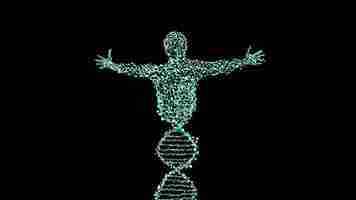People with Y chromosomes have shorter lifespans thanks to ‘toxic’ DNA
Scientists at UC Berkeley may have figured out why humans and other species with Y chromosomes tend to have shorter lifespans than their XX-chromosome counterparts. According to their research, our DNA is toxic.

What? Traditionally delineated into male and female, many species can be split into two majority groups consisting of those with XY chromosomes and those with XX chromosomes.
Scientists have long suspected that either the presence of the Y chromosome or the absence of the X was responsible for an observed difference in lifespans between the two DNA types. As it turns out, certain properties of the Y chromosome may ultimately be responsible.
Per the team’s research paper :
Why? The research indicates that repetitions in the Y chromosome are the culprit. As people with Y chromosomes age, this “repeat content” activates and produces toxic side-effects.
This link could help explain why humans and other creatures with Y chromosomes typically have shorter lifespans.
But? Almost all chromosomes have repeat content. In fact, most scientists believe the repetitive parts of living creatures’ DNA are essential components for species-wide and individual viability.
This makes narrowing down the “why” of Y chromosome-related lifespan deprecation a tricky challenge.
In interpreting the team’s results, it’s important to note the bulk of their research was conducted on fruit flies. The annoying but mostly harmless insect was chosen because, like humans, it can be split roughly into XY DNA types. But, when compared to humans, fruit flies have significantly more repetition in their Y chromosomes.
This makes them the ideal candidate to support a theory involving toxic DNA repetition, but it’ll take more study to determine how applicable these observations are to humans.
Quick take: A lot of people have Y chromosomes. If scientists can sort out why they tend to live shorter lives than their double-X counterparts, it could help establish potential interventions or genetic therapies for the toxic side-effects of our DNA.
Sony’s new AI agent achieves superhuman Gran Turismo Sport scores
One of the best things about computers is that they can learn just as much from a simulation as they can from so-called ‘real world’ experiences. That means, given the proper simulator, we can teach AI to drive cars without ever putting a single human in danger.

Just about every AI company trains their driverless vehicle algorithms using simulations. Until now, the simulators themselves weren’t all that interesting. They’re mostly just physics engines designed to be interpreted by a neural network. But Sony just unveiled the most popular autonomous driving simulator ever: Gran Turismo Sport .
In case you’re not a gamer: this isn’t advanced software designed to train AIs, it’s a game. And not just any game but the latest in one of the most beloved racing simulation series in history
Researchers from the University of Zurich and Sony AI Zurich recently published a pre-print paper showcasing the development of an autonomous agent designed to beat the best human players at the game.
Per the team:
In other words: It’s a legitimate simulation that’s used by real-world race teams to help determine real, expert-level drivers’ abilities. That’s pretty high praise for a video game.
The researchers had a pretty tall order to fill. While AI systems regularly outperform humans in games such as chess and Go, standard computer-controlled racers tend to fair poorly against expert human players.
The researchers write:
Rather than cheat or tweak the rules, the team turned to a facet of AI called deep reinforcement learning. This involved training the AI to recognize the road ahead and react in a more human-like fashion.
According to an article by Tech Xplore writer Ingrid Fadella, Yunlung Song, a co-author on the team’s research paper, said:
To the best of our knowledge this is the first time an autonomous car AI has beaten human experts in Gran Turismo Sport . And while there currently exists no artificial intelligence system capable of level five autonomy (able to drive a vehicle with no external aids or human-assistance), if you absolutely must ride in a vehicle controlled by an AI: may as well pick the one trained in a video game about pushing the physical limits of speed and control.
You can read the whole paper here .
So you’re interested in AI? Then join our online event, TNW2020 , where you’ll hear how artificial intelligence is transforming industries and businesses.
Google and Apple block update to England’s contact-tracing app over privacy violation
An update to England and Wales’ contact-tracing app has been blocked by Apple and Google for violating their location data collection rules.

When gyms, pub gardens, and non-essential shops reopened today, the COVID-19 app was supposed to have a new feature that would log every place that a user checked into. If they later tested positive, the app would inform other people who’d been to that venue.
But this collection of location data is prohibited by Apple and Google, who developed the decentralized API model on which the app is based. The update has therefore been blocked from Google Play and the App Store.
A spokeswoman for the UK’s Department of Health told the BBC that the new feature had merely been “delayed” and that the app’s core functionality has not been impacted. But privacy advocates have slammed the location-tracking plan.
Ray Walsh, a digital privacy e xpert at ProPrivacy , said it appeared the government was trying to trick the public into believing their data would be handled appropriately:
The government had initially intended to develop a homegrown contact-tracing app, but switched to Google and Apple’s more privacy-focused model last June.
Walsh said it was vital that the app continued to use a decentralized approach that doesn’t constantly track people’s whereabouts:
Greetings Humanoids! Did you know we have a newsletter all about AI? You can subscribe to it right here .